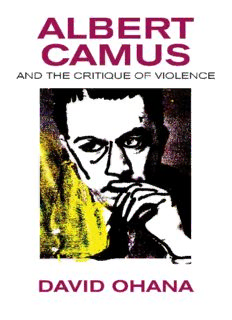
Albert Camus and the Critique of Violence PDF
Preview Albert Camus and the Critique of Violence
ohana 4 - index 01/09/2016 20:08 Page i Albert Camus’ preoccupation with violence was expressed in all facets of his work – as a philosopher, as a political thinker, as an author, as a man of the theatre, as a journalist, as an intel- lectual, and especially as a man doomed to live in an absurd world of hangmen and victims, binders and bound, sacrificers and sacrificed, crucifiers and crucified. Three main metaphors of western culture can assist in understanding Camus’ thinking about violence: the bound Prometheus, a hero of Greek mythology; the sacrifice of Isaac, one of the chief dramas of Jewish monotheism; and the cruci- fixion of Jesus, the founding event of Christianity. The bound, the sacrificed and the crucified represent three perspectives through which David Ohana examines the place of ideological violence and its limits in the works of Albert Camus. Cover illustration: Courtesy of Ronny Someck. Professor David Ohanateaches European history at the Ben-Gurion University of the Negev, Israel. He was a visiting fellow at The Sorbonne, Harvard, and Berkeley as well as the first academic director of the Forum for Mediterranean Cultures at the Van Leer Jerusalem Institute. His many books include: The Origins of Israeli Mythology (Cambridge, 2014), Israel and Its Mediterranean Identity (Palgrave Macmillan, 2011), Modernism and Zionism (Palgrave Macmillan, 2012), Political Theologies in the Holy Land: Israeli Messianism and its Critics (Routledge, 2009), and most recently, The Nihilist Order: The Intellectual Roots of Totalitarianism (Sussex Academic, 2016). ohana 4 - index 01/09/2016 20:08 Page ii For Menachem Brinker, a Genuine Intellectual and a Mensch ohana 4 - index 01/09/2016 20:08 Page iii ohana 4 - index 01/09/2016 20:08 Page iv Text copyright © David Ohana, 2016; cover illustration copyright © Ronny Someck. Published in the Sussex Academic e-Library, 2016. SUSSEX ACADEMIC PRESS PO Box 139 Eastbourne BN24 9BP, UK and simultaneously in the United States of America and Canada All rights reserved. Except for the quotation of short passages for the purposes of criticism and review, no part of this publication may be reproduced, stored in a retrieval system or transmitted in any form or by any means, electronic, mechanical, photocopying, recording or otherwise, without the prior permission of the publisher. British Library Cataloguing in Publication Data A CIP catalogue record for this book is available from the British Library. ISBN 978-1-78284-313-9 (e-pub) ISBN 978-1-78284-314-6 (e-mobi) ISBN 978-1-78284-315-3 (e-pdf) This e-book text has been prepared for electronic viewing. Some features, including tables and figures, might not display as in the print version, due to electronic conversion limitations and/or copyright strictures. ohana 4 - index 01/09/2016 10:30 Page v Contents Abbreviations vi Introduction 1 The Bound 13 The Sacrificed 59 The Crucified 102 Son of the Mediterranean 158 Notes 175 Bibliography 184 Index 190 ohana 4 - index 01/09/2016 10:30 Page vi Abbreviations [Com.] Camus in “Combat”: 1944–1947 (2005) [N.] Notebooks 1935–1942 (1963) [Rr.] Resistance, Rebellion, and Death (1961) [Po.] The Possessed (1961) [C.] Caligula and Three other plays (1960) [E.] Exile and the Kingdom (1978) [Fa.] The Fall (1978) [Sy.] The Myth of Sisyphus and other essays (1955) [R.] The Rebel (1960) [P.] The Plague (1948) [S.] The Stranger (1967) [Co.] Correspondence, 1932–1960 (2003) [F.] The First Man (1996) [Pr.] “Prométhée aux enfers” (1965) [A.] Algerian Chronicles (2013) [L.] Lyrical and Critical Essays (1969) [H.] A Happy Death (1972) ohana 4 - index 01/09/2016 10:30 Page vii ohana 4 - index 01/09/2016 10:30 Page viii I am a stranger. I am an outsider to philosophy, and my questions on philosophy come from my outsider’s point of view. JACQUESDERRIDA ohana 4 - index 01/09/2016 10:30 Page 1 Introduction The short life, works and intellectual outlook of Albert Camus were almost all connected with the question of vio- lence. At the age of one, he lost his father, who was killed as a soldier of the French army on the outbreak of the First World War. He passed his childhood and youth in colonial Algeria, and in his first years in conquered France he was edi- tor of an underground newspaper that opposed the Nazi occupation. In the years following the Liberation, he denounced from afar the Bolshevist tyranny, the Stalinist gulags and the dominance of the Soviet Union over its satel- lites in Eastern Europe. He especially condemned the Franco dictatorship in Spain. In his final years, he witnessed the “dirty war” between the land of his birth and his country. A tragic motor-accident cut short his productive, action-filled life, a life that more or less embraced the blood-soaked first half of the twentieth century. A visitor to his grave at Lourmarin, a village in the heart of Provence, cannot fail to be struck by its simplicity. It just con- sists of stones placed next to one another, and on its surface are inscribed the words “Albert Camus, 1913–1960”. Next to it is the grave of his wife, mother of his twins, equally spar- ing of words: “Madame Albert Camus, née Francine Faure, 1914–1979”. The graves are surrounded by a lavender bush and nearby there is a cypress. The little cemetery is situated at the foot of the hills surrounding Lourmarin. At seven o’clock in the morning only the birds are awake, apart from a gardener moving among the graves with a wheelbarrow and silently clearing away the leaves. The sustained silence of the gardener recalls the meeting of Camus and Samuel Beckett every morning in a park in Paris in which they did not say a word to each other for two hours and then parted, as though
Description: